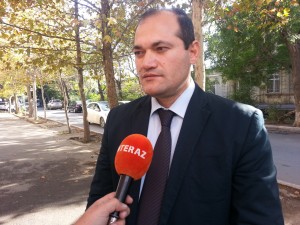“The party system has been killed.” An interview with Azerbaijan’s Razi Nurullayev

Chairman at “REGION” International Analytical Center (RIAC)
The same family has ruled Azerbaijan since October 1993, first with Heydar Aliyev ruling from 1993 to 2003, and then with his son Ilham Aliyev from 2003 onwards. Since 1993, Azerbaijan has seen a steady drop in political liberties while the government and economy have been strengthened through the promotion of the extractive industries with the opening of the Caspian oil and natural gas fields. Meanwhile, the war between Azerbaijan and separatist ethnic Armenians in the Nagorno-Karabakh region looms large, preventing economic reform and normalcy from returning to the country’s political system.
I recently interviewed Razi Nurullayev on recent developments in Azerbaijan. Mr. Nurullayev founded the Yox (No) movement in 2005, with the aim of resisting anti-democratic attitudes and spurring a transition to a more open society. He also works as a member of the Azerbaijani Popular Front Party, in opposition to the ruling New Azerbaijan Party. The party seeks to promote social justice, integration into Euro-Atlantic community, and economic liberalism.
In our interview, Mr. Nurullayev painted a picture of the Aliyev regime that is trying to tighten its control through policies of isolation. This pattern is demonstrated, for example, in the non-renewal of certain Peace Corps programsin Azerbaijan.
“The government believes the U.S. may import colored revolution into the country, and Peace Corps teachers may become revolution agents in the regions of the country,” he said. “The government believes that by removing the roots of any U.S. affiliated organizations may secure the country against any imported unrest and political activism.”
“The party system has been killed. Political parties in Azerbaijan need to find new ways to conduct politics.”
Under the regime’s new financing plan, his Azerbaijani Popular Front Party has been excluded from the state budget, a decision he deems “most unjust.” At the same time, he understands voters’ disillusionment with the opposition.
“Truthfully speaking,” he said, the “party platform is not attractive for the voters.” For decades, he explained, the opposition has been unable to foster change within the context of the government’s repressive tactics. “We haven’t lost our hope and do believe the nation will soon say its word. If we could have survived under these harsh circumstances, it means our fight will have results.”
Because the government has closed so many traditional channels for communications with constituents, the party out of necessity has migrated towards the Internet and social media as platforms for reaching voters.
“The party system has been killed,” he said. “Political parties in Azerbaijan need to find new ways to conduct politics.”
Making a reference to the Twitter and Youtube crackdown in Turkey, he argued that the future of online opposition is nevertheless threatened, as the Aliyev regime is likely to be encouraged by the “precedent” set by its bigger neighbor.
State-civil society relations have worsened, too, he said, with the promulgation of new laws since 2009 that have placed tight restrictions on NGOs. The U.S. government-sponsored National Endowment for Democracy, for example, as well as the organizations it funds, have come under intense scrutiny from the Aliyev government; meanwhile, many NGOs are finding it impossible to register with the Ministry of Finance, posing an extreme obstacle to their funding.
As a result of the government tightening its grip on Azerbaijani society – including the imprisonment of activist Hasan Huseynli, Nurullayev said, the West is taking notice. He noted the shift in U.S. policy – one that is less lenient of human rights violations than before. This change, he said, is not merely the product of a change in attitude of outgoing Ambassador Morningstar, but rather a reflection of broader U.S. policy, albeit one with its limitations.
“The new ambassador in Baku will continue along the path that Ambassador Morningstar took concerning democracy promotion,” even if “such direct criticism may not lead to a direct change in the government.”
I found the interview a useful revelation on the current status of Azerbaijan as well as the interplay between foreign and local interests. Despite recent events, the prospects for Azerbaijan still remain bright, and even Mr. Nurullayev remains hopeful.
by Joshua Noonan
Joshua Noonan is an Azerbaijan News Analyst; John Hopkins SAIS MA in Russian and Eurasian Studies, International Economics and is a Presidential Management Fellowship Finalist. He can be followed on Twitter at @JoshuaNoonan.
The opinions expressed in this article are the author’s own and do not reflect the views of their employer or Young Professionals in Foreign Policy.
http://www.ypfp.org/razi_nurullayev